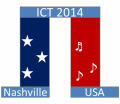Google Search
B7: Device and system performance
The performance of thermoelectric (TE) materials and modules has improved continuously over the past decades. For high temperature range (T>900K), one of the best TE material reported in literature is Silicon-Germanium (SiGe) alloy. The Thermoelectric laboratory of CEA synthesizes n-type and p-type SiGe pellets, fabricates TE modules, and integrates them into a Thermo-Electric Generator (TEG) which can be tested on a dedicated test bench with hot air as heat source. The SiGe TE material is made by Spark-Plasma Sintering (SPS) in diameter 60mm. N-type SiGe doped with Phosphorous reaches a peak value of ZT=1.0 at 973K, whereas the P-type SiGe (doped with Boron) reaches ZT=0.75 at 973K. Many TE legs are manufactured and their electrical resistivity is measured on a dedicated test bench; good reproducibility is measured (standard deviation lower than 4% on 10 wafers of both types). A silver paste based brazing technique is then used to assemble the TE legs in modules. The assembly technic is featuring a low and repeatable electrical contact resistance (<3 nano-ohms/m²). A test bench for TE module performances measurement at high temperature (up to 873K) was developed and 30 TE modules (size 20*20mm) were fabricated and tested. Their performances are reproducible and electrical output power did reach 1.9W (±0.2W) under 370K temperature difference. By rising temperature difference to 500K, electrical output power did increase to more than 3.6W corresponding to a TE module efficiency of 7%. An air-water heat exchanger was developed and 30 modules were clamped and electrically connected. The TEG will be tested on a gas bench and the expected output power delivered is 30 W with a gas flow of 15g/s and 973K. Using Silicon-Germanium TE modules did allowed to support such high gas temperature (>900K), as commercial TE modules based on Bismuth Telluride didn’t support a gas temperature higher than 573K.
